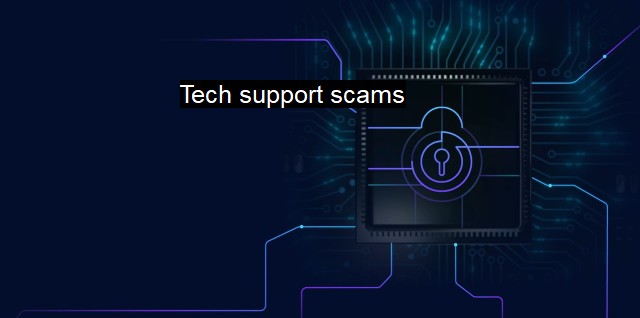What are Tech support scams?
Tech Support Scams: Understanding Their Tricks, Avoiding Victimization, and Countering Threats with Cybersecurity Measures.
Tech support scams have progressively become a major concern in the domain of cybersecurity, impacting several individuals, businesses, and corporations globally. Scammers have adopted sophisticated methods, exploiting the rising dependence of society on technology as well as the lack of technical expertise amongst the digital consumer-base.A tech support scam is a form of fraud where cybercriminals impersonate legitimate technical support representatives often from well-known technology firms like Microsoft, Apple, or antivirus manufacturers. These con artists trick unsuspecting users into believing they have serious technical issues such as malware or virus infections on their computers or smartphones. They manipulate users to pay for unnecessary support services, provide sensitive personal data, give them access to computer systems, or download malicious software.
There are several forms of tech support scams. A common method used by scammers is unsolicited phone calls or 'cold calls.' The perpetrators typically alert victims about contrived issues with their computers in an alarming manner. They request remote access to the victim's device to "address" the issue, during which they may potentially steal information or compromise the system.
Scammers may also employ contact via emails that appear to be from reliable technology firms. Containing alarmist messages that your system has been compromised, they would include a link that allegedly leads to customer support. This link often leads to a malicious site or initiates the download of harmful software.
Internet pop-up warnings can also serve as a method of manipulation. A pop-up might suddenly warn about a severe security threat on the device, urging to call on a listed number immediately. This call connects you with the fraudsters, either leading to fake-fixes for high fees or compromise of sensitive data.
Via search engine optimization poisoning, fraudsters make their fake tech-support websites appear as genuine entities in search engine results, duping users into disastrously acquiring bogus services.
The global rise in tech support scams inevitably links to the simultaneous increase in sophisticated malware and virus threats. A tremendous focus has thus been laid on deploying antivirus software as an immutable solution. Antivirus arrests the threats right at the execution stage by identifying the malware or virus-related suspicious activities. It also ensures the security of data by disallowing unauthorized access to the system and plugging any vulnerabilities.
Up-strengthening cybersecurity measures to prevent being a victim of tech support scams is essential. Variation in approach by cybercriminals calls for robust, dynamic cybersecurity management systems that not only rely on traditionally fixed algorithms but also use proactive algorithms to handle new threats. Awareness and adherence to cybersecurity practices substantially reduce threats of tech support scams as well.
Best practices include questioning unsolicited contact that offers assistance for tech-related issues, not clicking on links or downloading attachments from unverified emails, being cautious of alarming pop-up alerts and refraining from providing sensitive personal information.
Antivirus software manufacturers and genuine tech-support providers are strongly implementing systems to counter this fraud by tracking and demolishing suspicious IP addresses, restricting accessibility, and strengthening firewall constructions.
Tech support scams, a significant constituent of internet fraud, can lead to loss of privacy, financial damage, and substantial business impact. strategic advancement robust antivirus systems, and vigilance and awareness can considerably minimize this challenging threat. Supporting tech integrity globally involves collective efforts from technology firms, law-enforcement agencies, and general users towards understanding and mitigating tech support scams.

Tech support scams FAQs
What are tech support scams?
Tech support scams are fraudulent schemes that trick people into believing they need technical support services for their computers, software or other tech devices. Scammers use various tactics to create a sense of urgency and convince victims to give them remote access to their devices and pay for unnecessary services or software.How can I recognize a tech support scam?
Tech support scams often start with unsolicited phone calls or pop-up messages claiming to be from a reputable company, such as Microsoft, Apple or antivirus providers. Scammers may use scare tactics, such as warning you of a virus or system malfunction, and ask you to provide personal information or payment to fix the issue. It's essential to be skeptical and cautious of any unexpected tech support messages or calls, especially those that ask for sensitive information or payment upfront.What should I do if I suspect a tech support scam?
If you suspect a tech support scam, immediately disconnect from the call or close the pop-up message. Do not provide any personal information, payment or remote access to your device. You can report the scam to the Federal Trade Commission (FTC) or your local authorities.How can I protect myself from tech support scams?
To protect yourself from tech support scams, you should never provide remote access to your device or payment to unsolicited tech support. Ensure that you have reputable antivirus software installed and up-to-date. Also, keep your operating system, software, and security patches up-to-date, and avoid clicking on suspicious links or downloading files from unknown sources. Be vigilant and skeptical of any unexpected messages or calls, and always verify the legitimacy of companies and contacts before providing any sensitive information or payment.| | A | | | B | | | C | | | D | | | E | | | F | | | G | | | H | | | I | | | J | | | K | | | L | | | M | |
| | N | | | O | | | P | | | Q | | | R | | | S | | | T | | | U | | | V | | | W | | | X | | | Y | | | Z | |
| | 1 | | | 2 | | | 3 | | | 4 | | | 7 | | | 8 | | |||||||